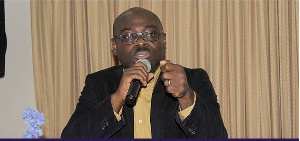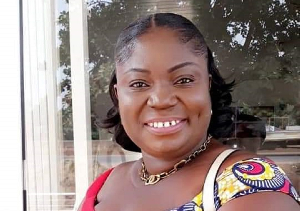- Home - News
- TWI News | TV
- Polls
- Year In Review
- News Archive
- Crime & Punishment
- Politics
- Regional
- Editorial
- Health
- Ghanaians Abroad
- Tabloid
- Africa
- Religion
- Election 2020
- Coronavirus
- News Videos | TV
- Photo Archives
- News Headlines
- Press Release
Opinions of Thursday, 31 July 2008
Columnist: The Chronicle
Is the Ghanaian Judiciary independent?
The problem of the executive trying to affect the functioning of the Judiciary is prevalent in a host of both developing and developed countries. The Ghanaian judiciary is often perceived to be highly corrupt, and a lot of research has been done to explore the causes and consequences of administrative corruption.
However, not a lot of studies have concentrated on the extent to which the executive can affect the judicial decisions by appointing and dismissing judges, and manipulating the law. The 1992 Ghanaian constitution has a number of shortcomings, and nebulous articles which can be exploited by the executive to obstruct the independent functioning of the Judiciary.
THE INDEPENDENCE OF THE JUDICIARY
The independence of the Judiciary has been established by Article 125(1) of the Ghanaian constitution states that 'justice emanated from the people and shall be administered in the name of the Republic by the Judiciary which shall be independent and subject only to the Constitution.'
Further, Clause 1 of Article 127 stipulates that the Judiciary shall not be subject to the control or direction of any person or authority in the exercise of judicial power in terms of judicial function, administrative responsibilities and financial administration.
The extent to which the legislative and executive branches of the government can influence the Judiciary has been given in Article 127(2) of the 1992 Constitution which provides that 'neither the President nor the Parliament nor any person whatsoever shall interfere with judges and judicial officers or other persons exercising judicial power, in the exercise of their judicial functions,' and that all state organs must accord the courts such assistance as they may reasonably require to protect their 'independence, dignity and effectiveness.'
Since financial dependence on another branch of the government can compromise the independence of the Judiciary, Article 179 of the constitution gives the Judiciary autonomy in the preparation of its annual budget. In addition, to provide the judges with financial security, the salaries emoluments of the judges are charged to the Consolidated Fund, and cannot be varied to a judge's disadvantage.
Despite the fact that the constitution lays the foundations for an independent Judiciary, several surveys have been conducted to gauge the public opinion about the independence of the Judiciary. For instance, a survey conducted by CDD-Ghana and the Friedrich Naumann Foundation in 2003 found that 73 percent of the public believed that executive influenced the Judiciary.
CORRUPTION
Most of the interviewees believed that social and political standing affect the way individual cases are decided. The same survey also found that Judiciary was ranked after police and customs services as the third most corrupt institution in Ghana in 2003.
Another study carried out by Africa Peer Mechanism Report (APRM) found that 57 percent of the elite respondents did not perceive the Judiciary to be independent. Another 65 percent households believed that Judiciary is free from the interference of the executive branch.
Though the majority believes that the Judiciary is free, the minority that doubts the extent of Judiciary's independence cannot be ignored for it comprises a significant proportion of aggregate households. Surveys, such as those mentioned above, show that the general public suspects that the executive branch of the governments, political parties, and government officials can curtail the independence of the Judiciary.
The appointment and dismissal of the Justices, judges, and the judicial staff is probably the most popular tool which is used by the executive to limit the independence of the Judiciary.
PRESIDENT'S POWER
Under Article 144, the Chief Justice is appointed by the president 'acting in consultation with the Council of State and with the approval of Parliament.' Other Supreme Court justices are appointed by the president 'acting on the advice of the Judicial Council', again in consultation with the Council of State and with the approval of Parliament. Judges of the Court of Appeal, High Court and regional tribunals are appointed by the president acting on the advice of the Judicial Council. The process of appointing judges and the Chief Justice, as described above, reveals that the President of Ghana is the most important actor involved in the appointment of the judges and justices.
The extent of the President's power becomes even clearer when the fact that the President also plays a key role in making appointments to the Council of State, an advisory body consulted by the President to appoint the Chief Justice.
The president appoints the majority of the 25 members of the Council of State, and there is no specified context for the nature of the 'consultation,' and, as applied in the Ghanaian political context, 'consultation' can merely mean 'informing.' Further, the approval by Parliament is by a simple majority which is likely to be obtained without many difficulties.
Unlike African countries such as, South Africa, Malawi and Nigeria, Ghana does not have a judicial services commission or equivalent body that has a strong role in judicial appointments.
In Nigeria, on the other hand, the Chief Justice and judges of the Supreme Court are appointed by the President 'on the recommendation of the National Judicial Council subject to confirmation of such appointment by the Senate.'
In India, a country with a long history of reforming the Judiciary, the Supreme Court has held that, in the constitutional requirement that the appointment of a judge other than Chief Justice shall be consulted by the president, 'consultation' means 'concurrence.'
WHY THE JUDICIARY IS WEAK
The Ghanaian Judicial Council, established under Article 153 of the constitution, is comparatively weak in its powers and responsibilities.
The Council has 19 members including the Chief Justice, Attorney General, one justice each from the Supreme Court, Court of Appeal and High Court, two representatives of the Ghana Bar Association, and other members of the legal profession, as well as four non-lawyers appointed by the president.
The Judicial Council proposes judicial reforms and considers matters aimed at assisting the Chief Justice to ensure effective and efficient justice. However, unlike various other countries, the Ghanaian Council does not play any role in the judicial appointments process other than giving unspecified 'advice' to the president; and in relation to the appointment of the CJ it has no role at all.
Apart from the procedure of appointing the judges and the Chief Justice, the appointments to the Supreme Court have also been controversial because of the lack of an upper limit on the number of Supreme Court Justices in the Constitution. Article 128(1) of the 1992 Constitution simply states that the 'Supreme Court shall consist of the Chief Justice and not less than nine other Justices of the Supreme Court.'
Therefore, potentially, the government could pack the court with its favourites to sit on particular cases. The ambiguity in the Constitution regarding the maximum number of the Justices of the Supreme Court becomes crucial when the Supreme Court reviews a decision of its own, and the full panel of the court is supposed to sit on the review.
The appointment of Justice Afreh to the Supreme Court in March 2002 provides a relevant example. Justice Afreh was appointed immediately prior to the review of the Tsatsu-Tsikata v. A-G case which challenged the constitutionality of 'fast track' courts. Justice Afreh's appointment increased the court's number and when the case was finally reviewed, the earlier verdict was overturned in favor of the state.
THE POWER OF CJ
Another relevant point to keep in mind is the power of the Chief Justice to decide which Justices sit on a particular case. Since the constitution does not provide any guidance on this matter, there exists no well defined procedure to determine that which subset of the justices is selected to hear a particular case.
If a Chief Justice owes his appointment to a particular political party or a government official, he or she might be tempted to select corrupt judges to sit on the cases in which that political party or the governmental official has vested political interest.
The fact that the executive branch of the government can proceed to dismiss the Chief Justice and justices of the superior courts without the supervision of a strong overseeing committee or elaborate procedural requirements has made the Chief Justice and superior court justices vulnerable to the pressure of the executive branch.
The threat of dismissal can be used to influence the way a particular court case is decided. Under Article 146 of the 1992 Constitution, the President, upon receipt of petition for the removal of a justice of a superior court, or for the removal of the chair of a regional tribunal, shall refer the petition to the Chief Justice.
If the case is prima facie, a committee formed by the Chief Justice and the Judicial Council is empanelled to inquire into the matter and make recommendations to the president, and the president is obliged to follow the recommendations of this committee.
Though it seems that the executive branch of the government does not play a significant role in the removal of a superior court justice, the fact that the executive branch can influence the appointment of the Chief Justice and members of the Judicial Council shows that superior court judges can potentially be removed to protect political and individual interests. The Chief Justice is even more susceptible to the threats of the executive branch.
As regards to a petition against the Chief Justice, the president acts in consultation with the Council of State and appoints a committee. Since in the case of the Chief Justice the Constitution does not explicitly require a prima facie case to be established before the process of removal is instituted, it makes it easier for a president to remove a Chief Justice who would not toe the executive line.
The information given above shows that there are numerous clauses in the 1992 Constitution which give the executive and the legislative disproportionate power over the functioning of the Ghanaian Judiciary.
The independence of the Judiciary, as laid down by international treaties and conventions, demands that no other branch of the government should interfere with the functioning of the Judiciary. Strong and independent judiciaries not only safeguard the rights of the citizens, but they also form the building blocks of prosperous and stable nations.
Though constitutions should not be treated as trivial documents that can be conveniently altered for the sake of political or personal expediency, many countries have successfully amended their constitutions to improve the efficiency of their institutions and governing bodies.
RECOMMENDATION Ghana can certainly improve the independence of its Judiciary by making a few judicious amendments to the 1992 Constitution.
The legislature can amend Articles 144 and 153 of the Constitution to ensure a stronger role for the Judicial Council in judicial appointments and adopt an upper limit on the number of Supreme Court judges.
It is imperative to enhancing the independence of the Judiciary that the Chief Justice should be given the same protection from removal as other superior court judges. Along with these constitutional changes, measures must be taken to eradicate administrative corruption in the Judiciary, and develop robust governing institutions which keep ensure that the delicate balance between the Judiciary and the executive remains intact.










